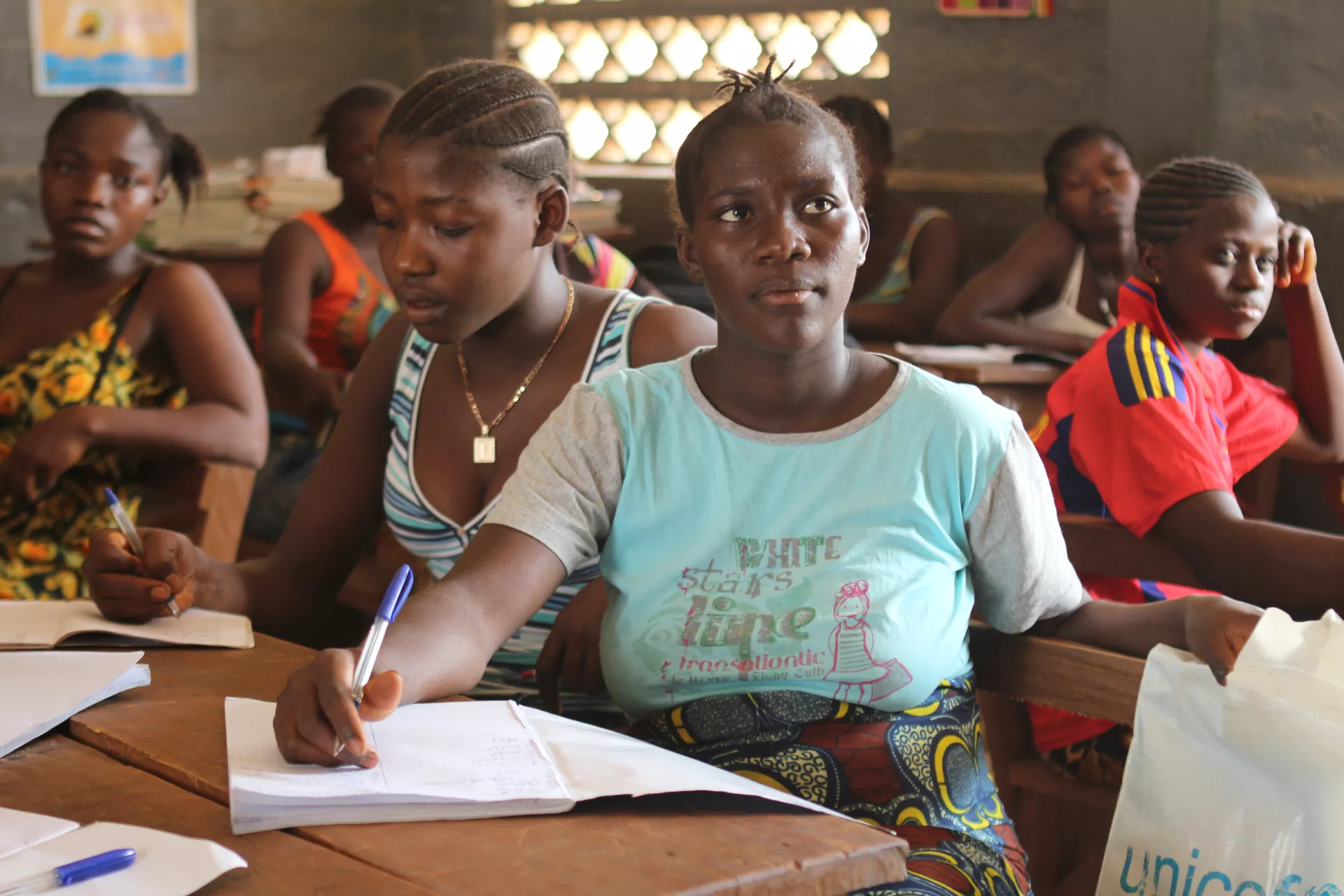A second chance at schooling for pregnant teenagers in Ebola-affected Sierra Leone
New initiative supports pregnant teenage girls who refuse to give up on their education

- Available in:
- English
- 中文
In Sierra Leone, a new initiative offers classes and resources to pregnant teenage girls, who are otherwise prohibited from attending school. Meet Adama, who became pregnant during the Ebola crisis but refuses to give up on her education.
KAMABAI, Sierra Leone, 28 April 2016 – Stepping into the classroom at the WCA Primary School in Kamabai, Bombali District, you immediately notice two things – all of the students are female, and many of them are visibly pregnant.
This is no ordinary school. These classes are part of a new initiative supported by the Ministry of Education, Science and Technology, UNICEF, the United Nations Population Fund (UNFPA), IrishAid and the UK’s Department for International Development (DFID). The programme provides education opportunities to girls in Sierra Leone who became pregnant during the recent Ebola outbreak.
Many of the girls and young women like 19-year-old Adama Conteh tell a similar story: living in vulnerable households, the rejection that came with becoming pregnant, and the immediate end to their regular schooling.
“I miss going to my normal school. I miss playing and talking with my friends,” said Adama, who was attending her second year at Junior Secondary School when she became pregnant. Her father died several years ago, and her mother scratches out a living growing ground nuts, beans and rice, though last year’s harvest was poor and the beans were burned in a bush fire.
Pregnant in emergencies
Visibly pregnant girls are not allowed to attend school in Sierra Leone. During the Ebola outbreak, more than 14,000 teenage girls became pregnant, including 11,000 who were in school before the outbreak, according to a study by UNFPA. For adolescent girls who got pregnant during the emergency, there is a high risk that many may not return to school.
“The teenage pregnancy rate increased so much in this area during the Ebola period, especially when schools were closed down for that long period,” said Mary Sesay, headmistress of the WCA Primary School, where classes for teenage girls and young mothers are held outside of regular school hours.

“Since we started this programme, we have been counselling girls on the dangers of teenage pregnancy and the repercussions on their growth and development. I am happy that the Government and the others thought about doing this kind of programme because it gives the girls an opportunity to make amends and take another shot at making their future better.”
With funding from DFID and Irish Aid, the Government and UNICEF are supporting more than 14,500 pregnant and recently pregnant teenage girls. They will be aided in schools and Community Learning Centres, and through school radio programmes while at home.
Breaking the cycle of poverty
“What I normally tell the girls is that education is the key to success,” said Ms. Sesay. “Women who are educated are almost always active family members. They are strong pillars in their families and are able to bring up their children and educate them. But if you have little or no education, your children will also be affected and the poverty cycle will continue in your family.”
Ms. Sesay also strongly encourages the girls to return to the normal school system after they give birth. According to her, some of the girls who enrolled in the programme were able to take the Basic Education Certificate Examination (BECE). She is hopeful that the majority will proceed to senior secondary school.
For Adama, the opportunity to continue her education has made a huge impact, and prevents what potentially could have been a complete end to her schooling.
“I attend the classes because I don’t want to lag behind much, since I can’t go to the normal school. I am very happy that this programme was brought here to help girls like me to continue learning even in this condition.”
After giving birth, she plans to return to regular school, and continue pursuing her dream of becoming a nurse.

